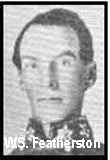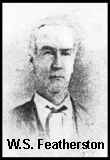|
Brigadier-General
Winfield Scott Featherston
He was born in Rutherford county, Tenn.,
August 5, 1821. He was educated at various academies and while at school
in Georgia, in I836, served as a volunteer against the Creeks. He
afterward studied law and was admitted to the bar in 1840.
He removed to Mississippi and soon became prominent in official circles.
He was elected to Congress as a Democrat and served from 1847 to 1851.
In 1860 he was sent by his State to confer with the authorities of
Kentucky on the subject of secession.

In May, 1861, he was made colonel of the Seventeenth Mississippi. He
took an active and honorable part in the first battle of Manassas, also
at Leesburg. On the 4th of March, 1862, he was commissioned
brigadier-general. His command was conspicuous in the Seven Days'
battles before Richmond, during which General Featherston was wounded.
He served in the Virginia army until January, 1863, when at his own
request he was sent to assist in the defense of Vicksburg.
He was assigned to the division of General Loring and was engaged in the
battle of Baker's Creek. At the close of this disastrous struggle
General Loring found his division cut off from the main body of
Pemberton's army, and marching eastward joined Gen. J. E. Johnston at
Jackson. After the fall of Vicksburg, Loring's division, to which
Featherston's brigade was attached, served under General Polk in
Mississippi. In the spring of 1864 these troops marched eastward and
joined Johnston at Resaca, Ga., in time to take part in that battle. In
all the subsequent battles of the Atlanta and Tennessee campaigns
Featherston and his men were engaged.

For awhile, when Loring was acting as corps commander (immediately after
the death of Polk), General Featherston had command of the division.
Featherston commanded his brigade in the final campaign in the Carolinas
and was included in the surrender of Johnston's army, April 26, 1865.
He then returned to Mississippi and resumed the practice of law. He was
a member of the Mississippi legislature from 1876 to 1878, and again
from 1880 to 1882. In 1887 he was made judge of the Second judicial
circuit of the State. This distinguished citizen of Mississippi, so
honored both in war and peace, died at Holly Springs, May 28, 1891.
Source:
Clement A. Evans, Confederate Military History, Vol. 7B (Atlanta:
Confederate Publishing Company, 1899), pp. 251-252.
All photographs of Generals on this page are
believed to be in the Public Domain.

|
